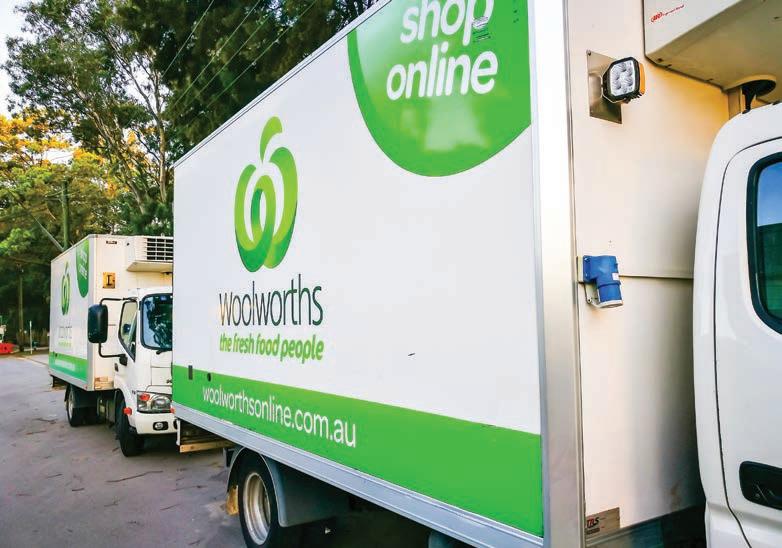
7 minute read
ALC
from MHD May 2020
by Prime Group
LEARNING EARLY LESSONS IN THE COVID-19 WORLD
Like every other industry, Australia’s freight and logistics sector has spent the past two months grappling with the realities of doing business in a changed world.
While for many this has meant transitioning to ‘working from home’ arrangements, contemplating shifts from ‘bricks and mortar’ retail arrangements to online sales in retail and a changed focus for hospitality businesses towards takeaway and delivery sales, the challenge for this sector is somewhat different.
The simple reality is this; those on the frontline of Australia’s freight logistics industry can’t ‘work from home’. Our ports, stevedores, road, rail and air freight operators are working tirelessly to keep supply chains flowing and make sure Australian communities can access the goods they need day-to-day.
As challenging as the COVID-19 crisis is, it would be far worse without the dedicated support and service offered by those working in Australia’s logistics industry.
All levels of government have made it clear that freight transport and logistics remain an essential service. In turn, this means that those who are working around the clock to support households and communities at this challenging time deserve the strongest levels of support and flexibility from governments and from the wider community.
In the difficult circumstances that all of us are currently enduring, the health and security of our workforce must remain paramount.
As instances of panic buying occurred in the early days of the COVID-19 event, it was distressing to hear instances of transport workers and in-store retail personnel being accosted by angry consumers.
The current situation is having an impact on the day-to-day lives of all Australians – and perhaps it is inevitable that this is causing frustration and irritation for some. However, taking those frustrations out on delivery drivers or retail workers is completely unacceptable.
Far more positive has been the
determined and collegiate way in which all parts of the supply chain have worked effectively to address challenges as they have arisen, to ensure that freight can continue getting to the places it needs to go, efficiently and safely.
This has included working to remove barriers that prevented overnight deliveries to supermarkets and retail outlets such as noise curfews that prevented heavy vehicle access and the use of loading docks. Industry worked quickly with state and territory governments around Australia to either remove these curfews or have their enforcement suspended for the duration of the COVID-19 crisis. This helped stock levels to recover and reduced the occurrence of panic buying.
The decision of several state and territory governments to effectively close their borders posed significant potential threats to the efficiency of road freight movement. Likewise, restrictions that initially saw roadhouse catering, driver lounges and even shower and toilet facilities closed were a threat to driver safety and well-being.
However, the road freight sector’s various representative industry associations (at both national and state levels) were able to collaboratively work with ministers to secure improved arrangements that will mean minimal disruptions for road freight. These outcomes will benefit consumers, help drivers to discharge their responsibilities safely and allow them to protect their own health.
Perhaps the most difficult aspect of the COVID-19 situation is the uncertainty over its duration. Naturally, this causes anxiety in the community and makes business planning especially difficult.
However, what is certain is that in addition to ensuring the community can continue to access essential goods, the freight and logistics sector also has a vital role to play in providing economic opportunity.
Already, there is evidence of some pick-up in consumer demand and economic activity in China, which will remain a critical export market for Australia.
As we look to sustain Australian businesses and create employment opportunities, our freight sector will be
Freight operators are working tirelessly to keep supply chains moving.
essential in supporting our exporters’ efforts to get their goods into recovering markets. Governments and local communities must understand the importance of their task as part of Australia’s economic recovery, and provide every support possible to help our workforce achieve it.
Of course, however long the COVID-19 crisis lasts, the reality is that the world that emerges on the other side may look very different. In terms of the operation of Australia’s supply chains going forward, the pandemic is likely to force industry and governments to more urgently consider some key questions.
Already, there is some commentary about the extent to which Australia relies on China, both for the import of manufactured goods and as an export destination. Although Australia has concluded trade agreements with other key growth markets over recent years, including Japan, South Korea and Indonesia, there remain opportunities to expedite similar arrangements with India and the United Kingdom.
This would stimulate further employment growth in Australia’s key export sectors, help to further diversify our supply chains and enhance their resilience.
Some of the disruptions to global supply chains witnessed in the earliest days of the COVID-19 crisis may also give Australian companies reason

to consider the global-local balance within their supply chains – and engineer an uptick in some aspects of local manufacturing that, prior to COVID-19, was thought by some to be in terminal decline.
The level and sophistication of technology in our supply chains is likely to be another discussion with a renewed sense of urgency in the wake of the COVID-19 experience, particularly if the pandemic endures for longer than initially forecast.
The automation and digitalisation of manual and paper-based processes will become especially important if the health impacts of COVID-19 affect labour supplies in the freight and logistics sector. Consumers may also be more alert to the provenance of their goods as they emerge from the crisis, wanting greater assurances about the safety and security of goods – including food products – as they move through the supply chain. This will require a more sophisticated approach to supply chain visibility than some parts of the industry have taken until this point.
None of these questions represent insurmountable challenges – and they may well present the industry with significant new opportunities. But they will require a deep consideration of how we can more effectively protect and enhance the resilience of our supply chains, so that they can better serve our communities. ■
THE ASCI RESPONSE TO COVID-19
We hope this issue of MHD magazine finds you safe and well. Here is the latest information on how we, your professional accreditation body, are supporting you right now:
1. Briefings with Federal and State Governments
ASCI has participated in weekly roundtables, briefings and meetings with Federal and State Governments. Our message is to build stronger, sustainable supply chains across Australia and the region, through a coordinated industry wide knowledge sharing and capability development. Our solution is short term and long-term financial stimuli for our members in the form of incentives for training and education. We will keep you informed of the outcomes of these briefings in the coming weeks as well as any other assistance provided to help you.

2. Winter Online Certification Review Classes are open for registration
These classes allow for self-study and shared online study during lock down periods to allow for upskilling and learning during COVID-19.
3. BAU in our delivery of member benefits: transferring events to webinars
The national ASCI Networking Breakfast event program has been converted to weekly webinars for ASCI Members. This allows for connection; learning; and a continuous professional development program for those maintaining a registration or certification (1 CPD point per webinar). Webinars are recorded and made available in the ASCI Resources Library for ASCI Members only and ongoing discussions are in the ASCI Members Closed Groups on Linkedin.
4. Minimising financial hardship for individual and student members
If you are experiencing financial hardships due to COVID-19 which may
Alexandra Riha is President of Australasian Supply Chain Institute.
affect your membership renewal, please contact the ASCI National office at enquiries@asci.org.au
The past few months has certainly tested our resilience as supply chain practitioners but, on the flip side, it has demonstrated the importance of supply chain to the nation. An ASCI poll conducted this month on how the COVID-19 situation might impact your supply chain revealed that you are most likely to: • enhance your BCP capability supported by supply chain resilience • consider local or near shoring • enhance your S&OP processes • expand your network with more stockholding facilities • invest in more predictive supply chain capability
Likewise, during testing times, the worth of your industry body is also a crucial time for representation. We have sent a clear message that ASCI will work with Government to develop and contribute to industry policy and research initiatives and build a supply chain knowledge framework to build and support resilient supply chain networks. To this end, we have accepted an invitation to join the
Standards Australia Black Economy Project Taskforce Technical Committee
to examine how standards and other guidance materials can support the taskforce’s recommendation, including the development of standards to support supply chain integrity.
We hope that you will continue to support ASCI so that we can continue to represent our valued supply chain community.










